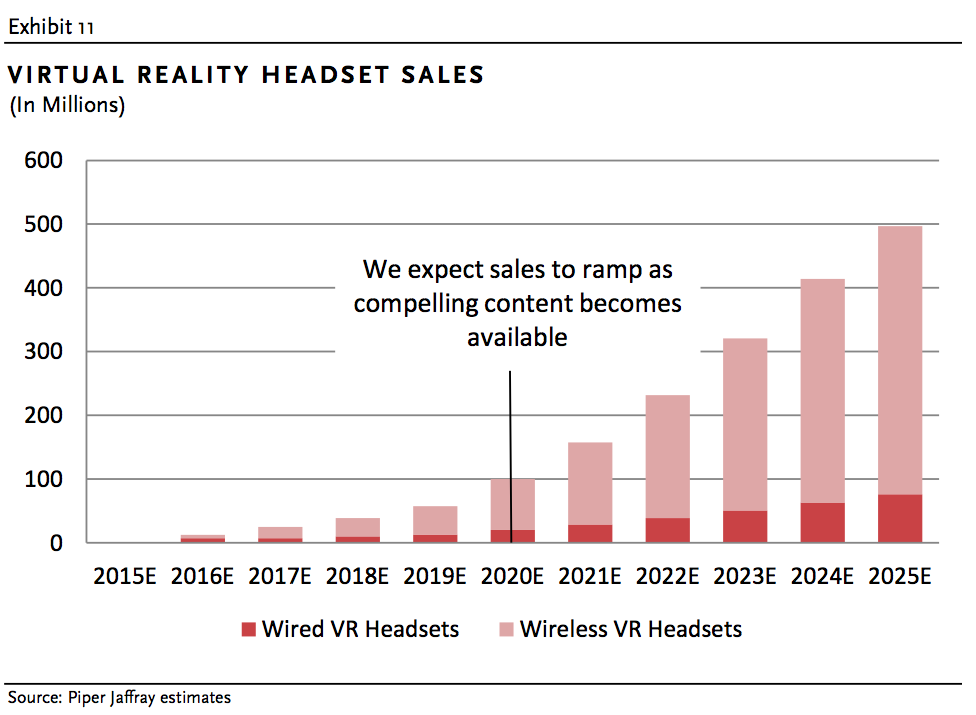Analyst reports on VR – we’ve heard them before from companies like KZero and Super Data, but when Gene Munster, the senior research analyst at Piper Jaffray – one of the largest and oldest financial institutions in the US – releases a 53-page report on virtual reality, we tend to listen. Especially when it brings up Apple specifically.
At Piper Jaffray, Munster’s main focus and specialty has been the Internet, which he has covered since he joined the company in 1995. His focus over the years has been on Google, Yahoo!, and Amazon. Munster has also been recognized as the “Top Apple Analyst” by Business Insider, and is ranked as the #2 analyst in the world according to TipRanks.com. Needless to say, Munster’s words carry a lot of weight, especially within the investment community.
In the report, Munster takes a very bullish position on VR but is perhaps a bit more conservative than other some other analysts have been about the growth. “Although we are optimistic about VR’s adoption rate,” says Munster, “we realize some individuals are conservative (the late majority and laggards) and may be resistant to replace traditional ways of doing things much like many writers relied on typewriters years after word processing made them obsolete.” Munster believes that 2020 will be the year that VR really hits its tipping point with a predicted doubling of growth that can be seen in the graph below:
The reason for this big tipping point, is form factor and price converging in 2019, along with a better mastery of content creation within the new medium. In 2019, Munster predicts, headsets will have a form factor similar to sunglasses – a goal that Oculus and Zuckerberg have oft mentioned.
Once VR hits that initial tipping point, Munster doesn’t see anything stopping it from reaching his prediction of half a billion VR headsets sold per year by 2025. “After an initial phase of slower growth we expect consumer awareness and interest to compound and expect hardware and content sales to uptick significantly. We also don’t see events that could cripple or stagnate VR adoption, such as negative publicity associated with violent games or movies.”
Another thing leading to the rapid increase in adoption, Munster believes, will be Apple’s ascension into the VR scene. “Based on conversations with industry contacts,” says Munster, “we believe Apple will join Facebook and Google in pursuing the VR and AR industry, and they have a small team working and exploring the augmented reality space.” This by no means is a confirmation, and should be taken with a grain of salt, but Munster is widely regarded as one of the top experts on Apple – despite getting it wrong with Apple TV.
The report concludes that Apple’s continued focus on fashion will be its major advantage, “We believe Apple’s evolving fashion advantage means that they can uniquely develop products that consumers will actually want vs. prototype style offerings today.”
Munster believes that while VR will take off first, it will be closely followed by AR, which he believes “will likely be bigger than VR.” Not by a small margin either the report estimates “that AR will account for the other 70% of the opportunity for virtual environments.”
Much like Noah Falstein of Google, and a number of other leading industry experts, Munster sees the fields of augmented reality and virtual reality converging together, “we believe virtual reality and augmented reality will start out on opposite ends of the spectrum but as technology progresses it will converge to form ‘mixed reality.'” The convergence will be inevitable he says because “there are clear benefits to both technologies.”
Not everything in the report was rosey for VR enthusiasts. Those who lamented over the Facebook acquisition of Oculus last year are bound to cringe with this next prediction (prepare your pitchforks): “In five years, we expect Facebook will charge a toll for third party hardware manufacturers and developers to access the platform to sell games, experiences and products.” Facebook has had a long standing mission to take over the Internet by bringing as much as they can into it’s personal walled garden. If Munster’s vision were to come to life, it would verify the concerns of those who believed Zuckerberg wanted to get out in front of the next platform for computing – and make it a walled garden from the beginning. The Facebook phone may have failed, but by God Zuck wouldn’t let this one pass him by. I think though that the proliferation of headsets from companies like Sony and HTC/Valve will help to prevent us from an all seeing Facebookified future.
Munster’s predictions in this report paint a big future for the industry that will hopefully be more accelerated than even he has predicted.



























